Have you ever tried using diatomaceous earth in the garden? This weekend I spent hours out in the backyard planting seeds and plants from the nursery. Then, I came inside and ordered a bag of it so I can start using it in the garden as soon as possible. You know why? Because every year I lose my zucchini plants to squash bugs! Keep reading to learn how to use diatomaceous earth in a vegetable garden. (and if you want more tips on gardening, check out my post about The Vegetable Gardener’s Bible).
Posts feature partner companies & may be sponsored. Post contains affiliate links & I will be compensated if you make a purchase after clicking on links. As an Amazon Associate I earn from qualifying purchases.
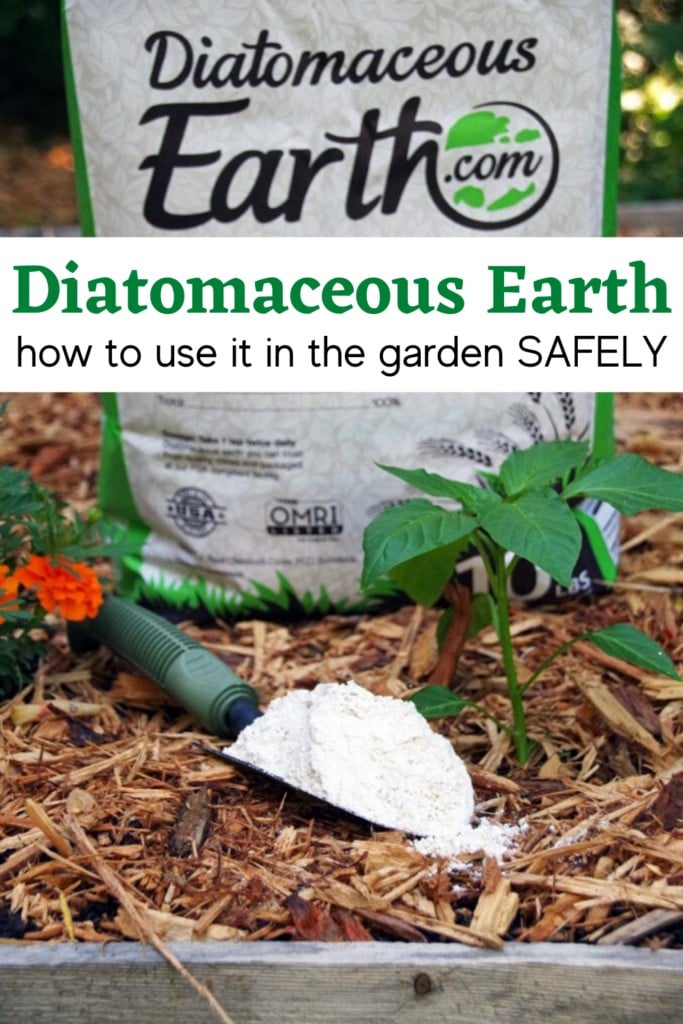
Table of Contents
Using Diatomaceous Earth In A Vegetable Garden
I generally stick to organic gardening and use absolutely nothing on my garden plants. However, that often means that my hard work is ruined by squash bugs and tomato hornworm caterpillars.
This year, I am going to try to find a balance between organic gardening and actually getting to eat the fruits of my labor. Since diatomaceous earth is a very effective natural pest control method, I decided to give that a try first.
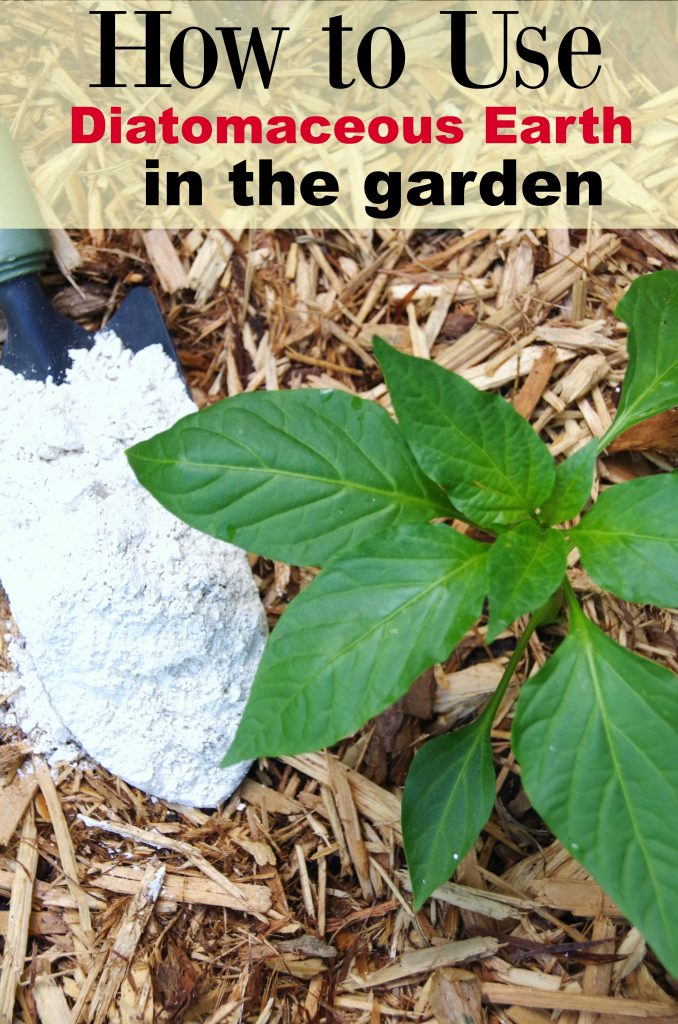
✯Don’t want to miss the next post?✯
Follow Turning the Clock Back on Facebook | Twitter | Pinterest
Or join the private Facebook group for simple tips on going green!
What is Diatomaceous Earth?
First off, what is diatomaceous earth? I’m going to get all science geeky here for a minute. Diatomaceous earth is an ultra-fine white powder made from the fossilized remains of algae-like plants called diatoms.
It works as an effective, natural pest control because the powder is razor-sharp on a microscopic level. It will only feel like chalky powder to your hands but it slices into the outer layer of the insect and kills them. What insects are killed with diatomaceous earth? pretty much all bugs. So, use cautiously and only when necessary.
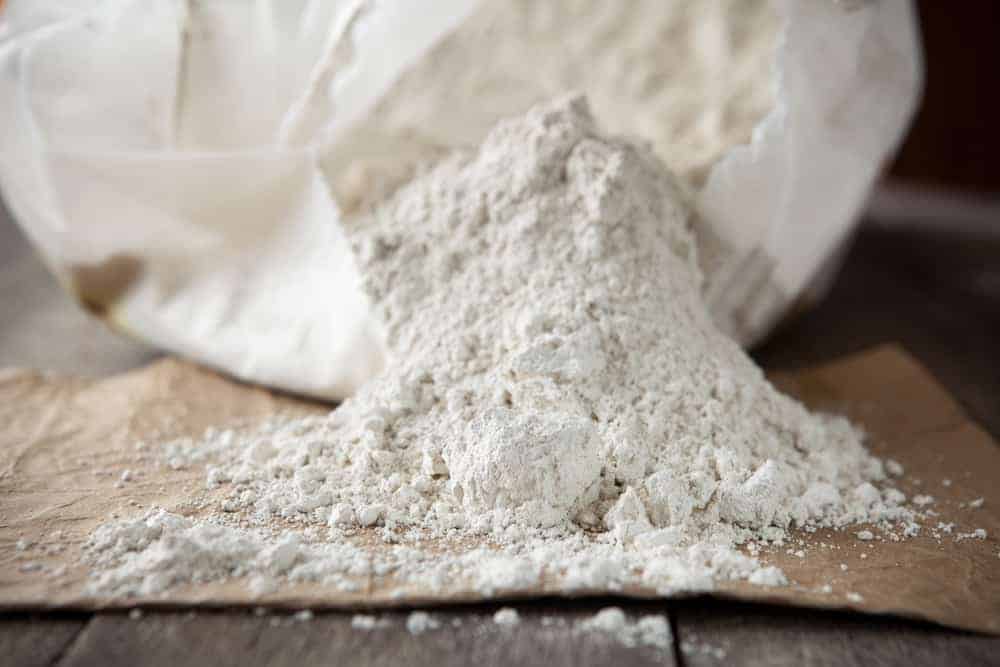
Tips for Using Diatomaceous Earth in the Garden
Diatomaceous earth is not a chemical but there are some considerations to take into account when handling it. I will address a few of those concerns below but read the package before you begin using diatomaceous earth in the garden.
If you want to keep snails out of the garden or get rid of squash bugs, it may be a good solution. Growing lettuce (for me anyhow) is challenging because of slugs and earwigs in the garden so I use it sparingly around those plants when needed.
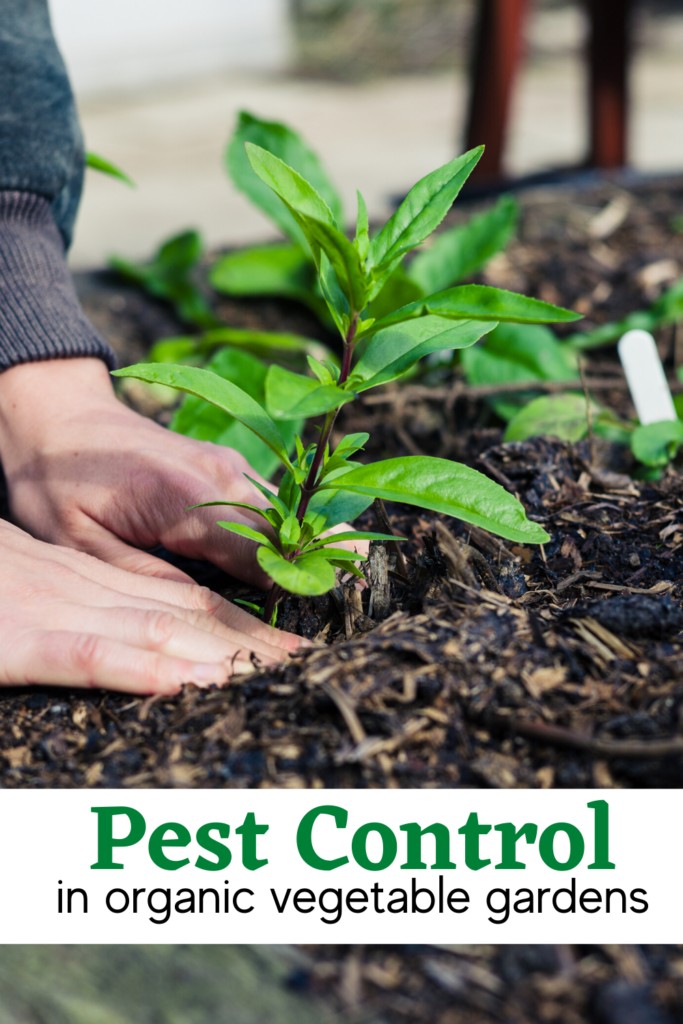
The best diatomaceous earth for gardens
Remember, these are garden plants that will be providing you with food. Everything you use on your garden should be safe and non-toxic. This is especially important if you have kids and pets running around in the backyard. Here is the food grade diatomaceous earth that I bought for my own garden.
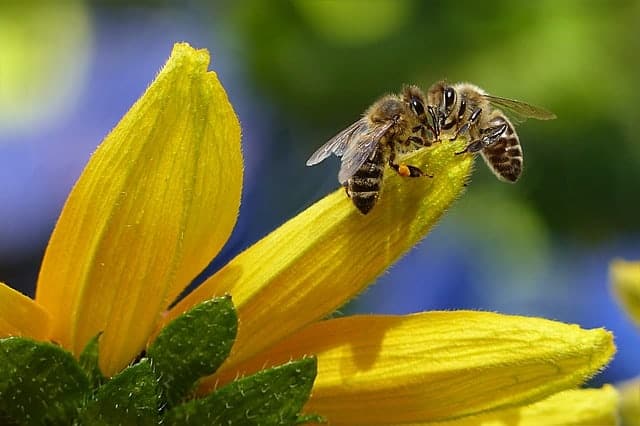
Is diatomaceous earth safe for bees?
My biggest concern in using diatomaceous earth in the garden is that it will kill honeybees. The research I did shows that it isn’t GREAT for them but doesn’t kill them outright either because of the protective hairs they have on their body. However, in order to minimize their exposure, apply the diatomaceous earth only to the soil and avoid the blossoms completely.
Since honeybees spend most of their time in the flowers, using diatomaceous earth only on the soil should protect them from most of the exposure. Also, try using diatomaceous earth in the garden when bees are not around to minimize exposure.
Early evening once the sun starts going down is the perfect time because many garden pests are just starting to wake up and get hungry but bees generally are back in the hive. Diatomaceous earth is safe for bees when used properly!
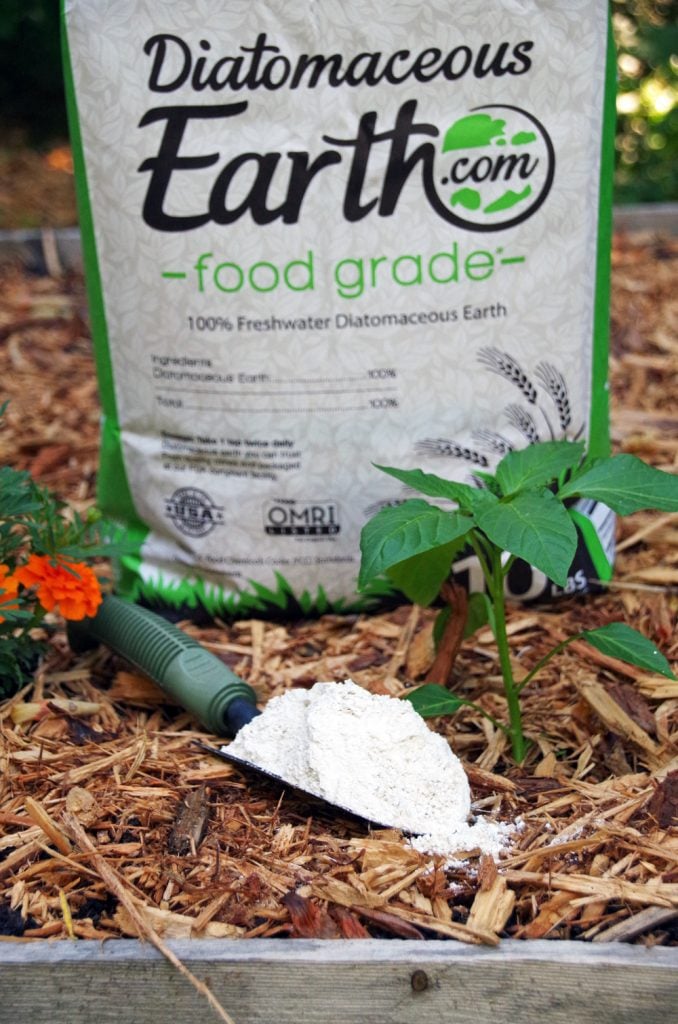
Is diatomaceous earth toxic to humans?
Is diatomaceous earth dangerous for humans? No. However, it can be an irritant. Try to avoid making clouds of diatomaceous earth powder. Wear a mask when using it to protect your lungs. Wear gardening gloves if using your hands to apply it to your garden. You can also buy a shaker container and avoid getting it on your hands completely.
How often should you apply diatomaceous earth?
Because diatomaceous earth has to actually contact the bugs in your garden, it needs to be present to work. That means after a rain or after you water the garden, you need to reapply.
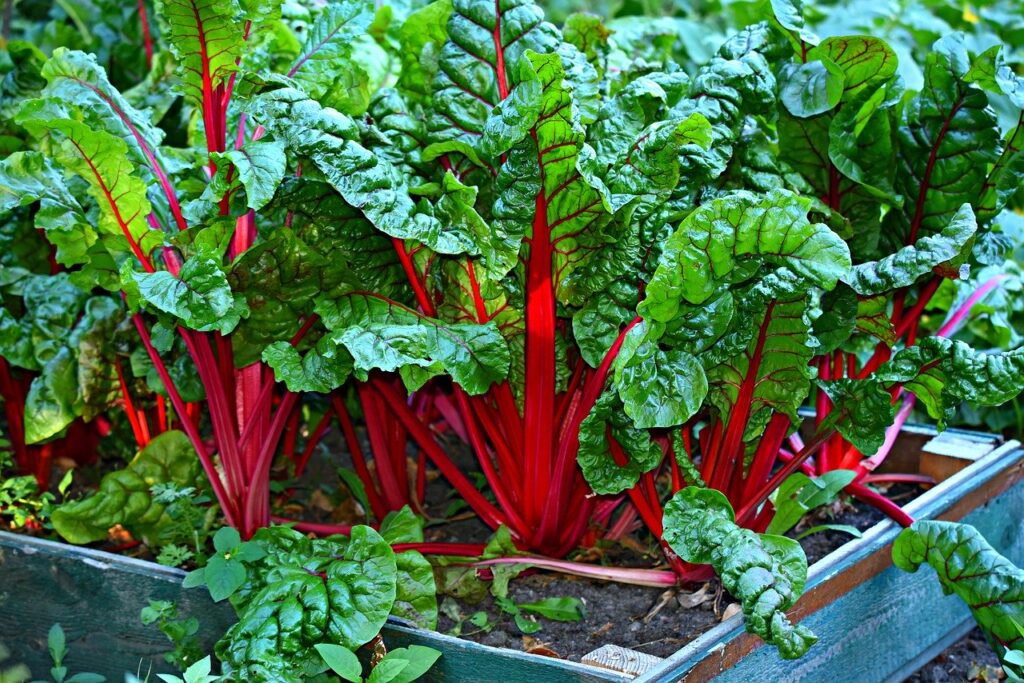
Use only where you need it:
Don’t use diatomaceous earth in the garden by throwing it liberally all over the place. Use it only on the plants that have a problem. I know that my zucchini are going to attract squash bugs so I will sprinkle it on those areas.
However, my hot peppers are resistant to just about everything but the giant bunny in the backyard so I won’t use diatomaceous earth on the peppers. I will, however, buy myself some rabbit repellent because I lost all 6 jalapeno plants to one rabbit last year! Treat your garden plants sparingly and keep a close eye on them!
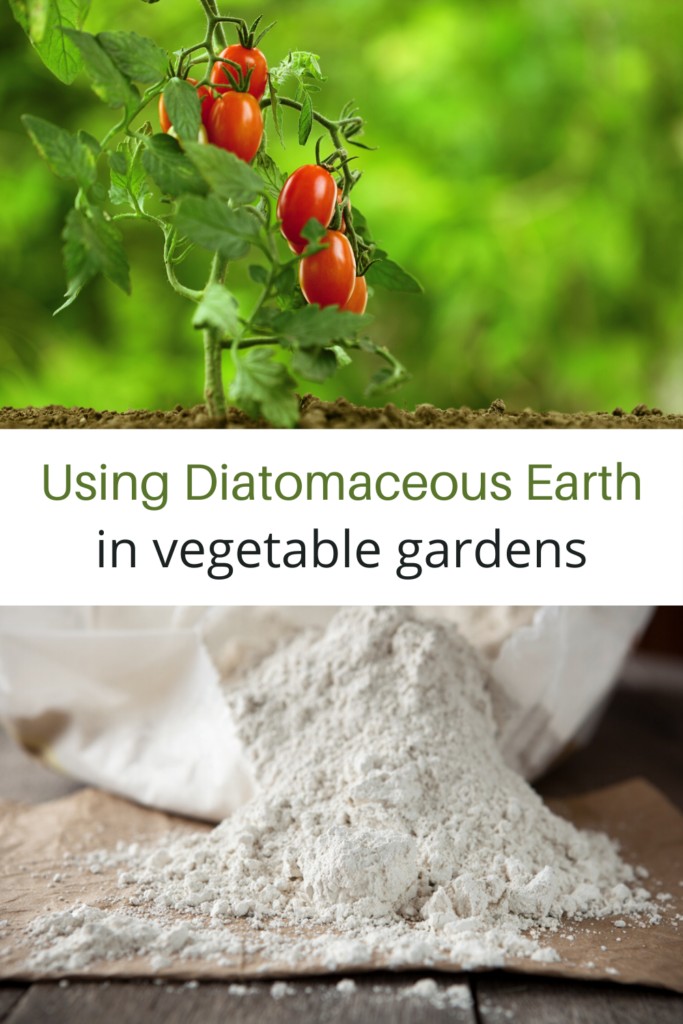
Should you use diatomaceous earth in vegetable gardens?
Using diatomaceous earth in the garden has it’s pluses and minuses. Yes, it is natural and non-toxic but it also kills beneficial insects as well as garden pests. I am hoping that it will help me protect my garden from pests and reap the reward of all my hard work without using toxic chemicals and killing beneficial insects as well. Have you ever tried using diatomaceous earth in the garden? If you enjoyed this post, please check out my article on how to attract toads to your yard.
Learn how to attract beneficial insects to your garden! Just click the photo below!

Diane is a professional blogger and nationally certified pharmacy technician at Good Pill Pharmacy. She earned her BS in Microbiology at the University of New Hampshire and has worked in cancer research, academics, and biotechnology. Concern over the growing incidence of human disease and the birth of her children led her to begin living a more natural life. She quickly realized that the information she was learning along the way could be beneficial to many others and started blogging and freelance writing to share this knowledge with others. Learn more about her HERE.

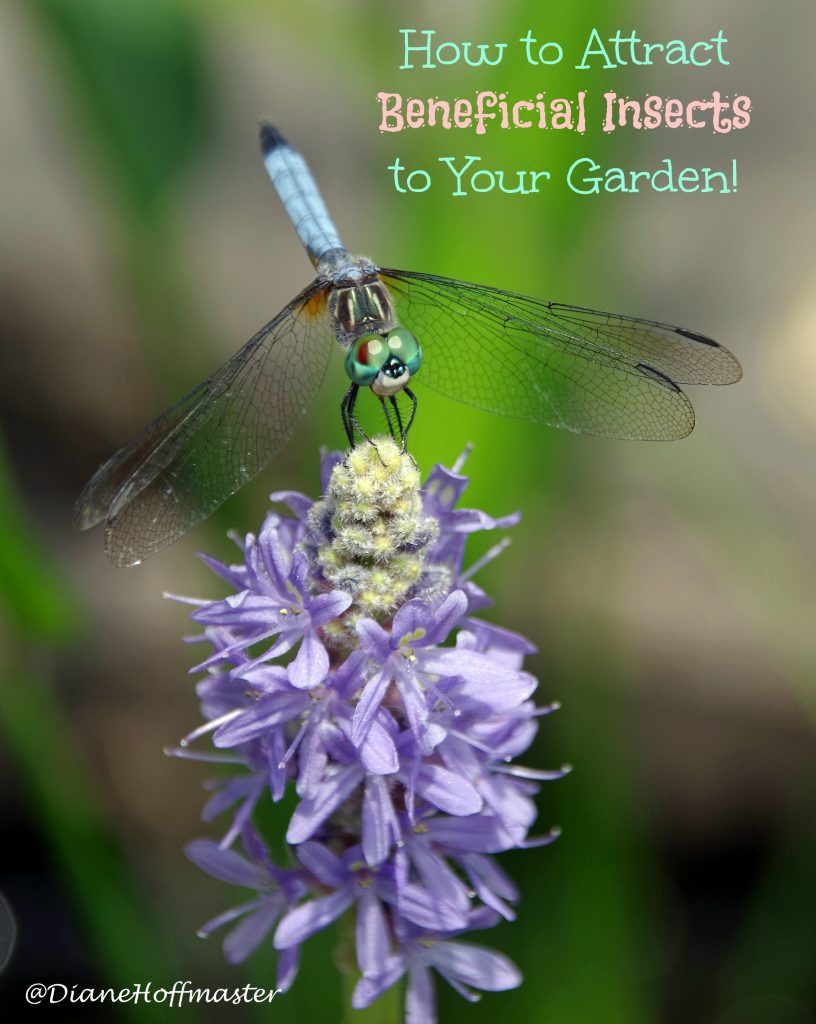
This is a really cool idea, I honestly am new to garden ideas but hope to do a little flower garden this year. Thanks for the tips!
I really need to get my garden up and running again. I loved my garden.
Love this idea! I do love gardening and it’s just about that time to get started. At least in my area.
Will diatomaceous dirt kill ants? Lawn and garden have been over ran all summer. I’m thinking of spreading it under pavers as a start Lots of ant eggs there
everything I have read says yes, it will kill ants!
We have had good luck with it on fire ants. You may have to reapply, but it works here in the south!
I have lived in Houston and am now in metro Atlanta. Fire ants are HORRIBLE little creatures and I definitely don’t want them in my yard!
Thank you for this informative article! It helps me a lot. I too prefer organic gardening and pest control, yet yearn for the post-card quality vegetables as a result. It’s a continuous learning process, so I continue to investigate. Thanks again.
It’s kind of amazing how much there IS to the balance of nutrients, compost, and drainage aspects of gardening! I love the challenge of grasping how to put those components together effectively. When I was a kid, we had a gigantic vegetable garden! I came to hate it after spending hot hours in the summer weeding, hoeing, sweating, and slapping mosquitoes instead of playing. You know, those inevitable chores your parents secretly delight in handing out. In fact I swore I’d never have a garden when I grew up! How little did I realize the apple indeed doesn’t fall far from the tree. Pun intended. So now I find my little garden has gotten bigger and more involved every year over the past five years. I dug it up by hand in the sunniest place in my yard – a place the neighbors say has never held a garden in the forty-four years they’d owned their home. So, with spade, wheel barrow, pitch fork, and loom screen in hand I made my first garden plot. That was my first learning curve. Since the soil was fluffy all the way down, the roots of my vegetable plants had plenty of room to expand! Bigger root system, bigger plants. My cherry tomato plants were SIX FEET TALL, no exaggeration. I took a picture of my husband standing next to them for posterity. It’s a lot of work and even a bit of a worry, but I enjoy it through and though.
I definitely wish I had better soil and more sun. Those are my biggest challenges when it comes to gardening here. But just being able to go out and pick something to eat from my own back yard is so incredibly rewarding! And I really do hope my kids grow up and start their own one day!
After many years using diatomaceous earth, I have given up even if it’s very efficient for slugs and snails. For example, if you have a very rainy summer where the “bad” bugs seem to explode in numbers, you will need to reapply it constantly day after day. Doesn’t work either if you apply it on wet soil. It absorbs humidity in the space of half an hour and becomes useless. So you would need a lot, I mean “a lot” just to try to get some results. Same with morning/evening dew.
This being said, if you live in an area where there is very little rain in the summer, it works just great.
It definitely has limitations and moisture is one of them. Using on dry ground is important but hard to do during a rainy summer!
I’m a huge fan of DE. I agree it needs to be used responsibly. I add DE to the compost bin to keep ants from setting up house. When in Sedona Az I used it under dressers, deck, garage door mat, and back of closets to keep scorpions out of the house. Once or twice a year I’d add more. So times I’d find dead scorpions so they did get in but at least they were not nesting in my shoes…
I would certainly use it regularly if I had scorpions around! We have palmetto bugs (GIANT cockroaches!) and those things are terrifying enough!
We found DE the only thing to get rid of black aphids (on garlic chives). Had previously dusted our cattle with it to eliminate lice – on that line I Feel it would be good on chooks who often have lice problems. But I would be dubious about using it on cats and dogs as they might lick it.
we get aphids on our chives occasionally and it is definitely a good solution!
I mix a couple of tablespoons of DE in water and spray all my plants. As the water evaporates the DE is left on the plants. This works great and it is a safe organic way to protect the garden. I use 2 heaping TB of DE per gallon of water in a pump sprayer. When I can no longer see the DE on the plants because of rain I simply spray again. Don’t worry about children or pets (my opinion only) because some people mix a little in a glass of water and drink it for their health on a daily basis. Google it for health info. You will be surprised.
Thanks for the tip! Sounds like a great way to reduce pests on the plants themselves!
We have bare spots in our grass, and they continue to get larger. We were told that grubs were probably causing that. Do we need to work it into the ground?
Im not sure if this would work since I am pretty sure the grubs that eat the grass roots are underground? DE works on contact and I don’t think working it into the soil would allow it to remain affective.